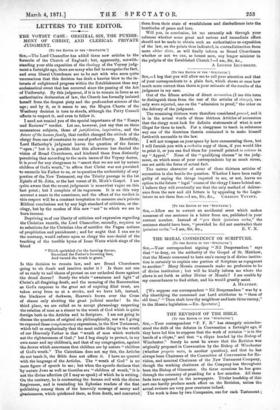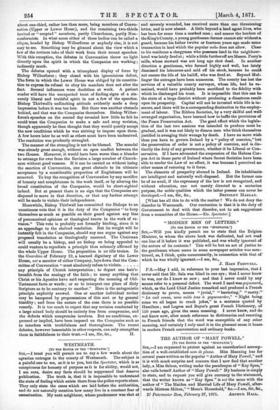THE REVISION OF THE BIBLE.
[TO THE EDITOR OF THE "SPECTATOR."]
SIR,—Your correspondent "F. F. B." has strangely misunder- stood the drift of the debates in Convocation a fortnight ago, if they have led him to suppose that the work of revision "is in the hands of a clique," and that "a clique headed by the Bishop of Winchester." Surely he must be aware that the Revision was originally proposed in Convocation by the Bishop of Winchester (whether proprio motu, is another question), and that he has always been Chairman of the Committee of Convocation for Re- vision, and nominal Chairman of the New Testament Company, though the working chairman of the Company has throughout been the Bishop of Gloucester. On three occasions he has gone through the ceremony of presiding for a few minutes. All these facts have appeared in the newspapers. Titular headship of this sort can hardly produce much effect on the Revision, unless the actual revisers are very poor creatures indeed.
The work is done by two Companies, one for each Testament ;
about one-third, rather less than more, being members of Convo- cation (Upper or Lower House), and the remaining two-thirds invited or " coopted " members, partly Churchmen, partly Non- conformists. In what sense either of these bodies can be called a clique, headed by Bishop Wilberforce or anybody else, it is not easy to see. Something may be gleaned about the view which a few of the revisers take of their work from their recent speeches. With this exception, the debates in Convocation throw no light directly upon the spirit in which the Companies are working ; indirectly much.
The debates opened with a triumphant display of force by Bishop Wilberforce ; they closed with his ignominious defeat, The form in which the Lower House was obliged by its constitu- tion to express its refusal to obey his mandate does not alter the fact. Several influences were doubtless at work. A patient reader will have the unexpected treat of finding signs of a sin- cerely liberal and truthful spirit in not a few of the speeches. Bishop Thirlwall's unflinching attitude evidently made a deep impression before it was too late. But there was another obstacle behind, and that was the Companies themselves. Bishop Wilber- force's speeches on the second day revealed how little he felt he could trust the Companies to make a safe and snug revision, though apparently he then thought that they would quietly accept the new conditions which he was striving to impose upon them. A few hours later he as well as others must have been undeceived. The resolution was prudently strangled.
The manner of the strangling is not to be blamed. The scandal was already great enough, without an open conflict between the two Houses. Moreover, it would have been worse than a blunder to estrange for ever from the Revision a large number of Church- men without good reasons. If it can be carried on without losing the sanction of Convocation, one great obstacle to its ultimate acceptance by a considerable proportion of Englishmen will be removed. To buy the recognition of Convocation by any sacrifice of honesty and completeness in the work itself, or by altering the broad constitution of the Companies, would be short-sighted indeed. But at present there is no sign that the Companies are disposed to move in that direction, or that any further attempt will be made to violate their independence.
Meanwhile, Bishop Thirlwall has committed the Bishops to an unanimous vote that it is the duty of the Companies "to keep themselves as much as possible on their guard against any bias of preconceived opinions or theological tenets in the work of re- vision." This vote is probably not formally binding, since it is an appendage to the shelved resolution. But its weight will be instantly felt in the Companies, should any one argue against any proposed translation as theologically unsound. The Chairman will usually be a bishop, and no bishop on being appealed to could venture to repudiate a principle thus solemnly affirmed by the whole Upper House. The proposition is no idle truism. In the Guardian of February 22, a learned dignitary of the Lower House, not a member of either Company, lays down that the Com-
mittee of Convocation "must absolutely refuse to violate any principle of Church interpretation ; to depart one hair's- breadth from the analogy of the faith ; to unsay anything that Christ or his Apostles have said respecting the meaning of Old- Testament facts or words ; or so to interpret one place of Holy Scripture as to be contrary to another." Here is the antagonistic principle explicitly avowed. One or another individual reviser may be hampered by prepossessions of this sort or by general timidity ; and from the nature of the case there is no possible remedy. It is too much to expect that any revision conducted by a large mixed body should be entirely free from compromise, and the defects which compromise involves. But no conditions, ex- pressed or implied, have been imposed on the Companies such as to interfere with truthfulness and thoroughness. The recent debates, however lamentable in other respects, can only strengthen them in faithfulness to their trust.—I am, Sir, &c., H.



































 Previous page
Previous page